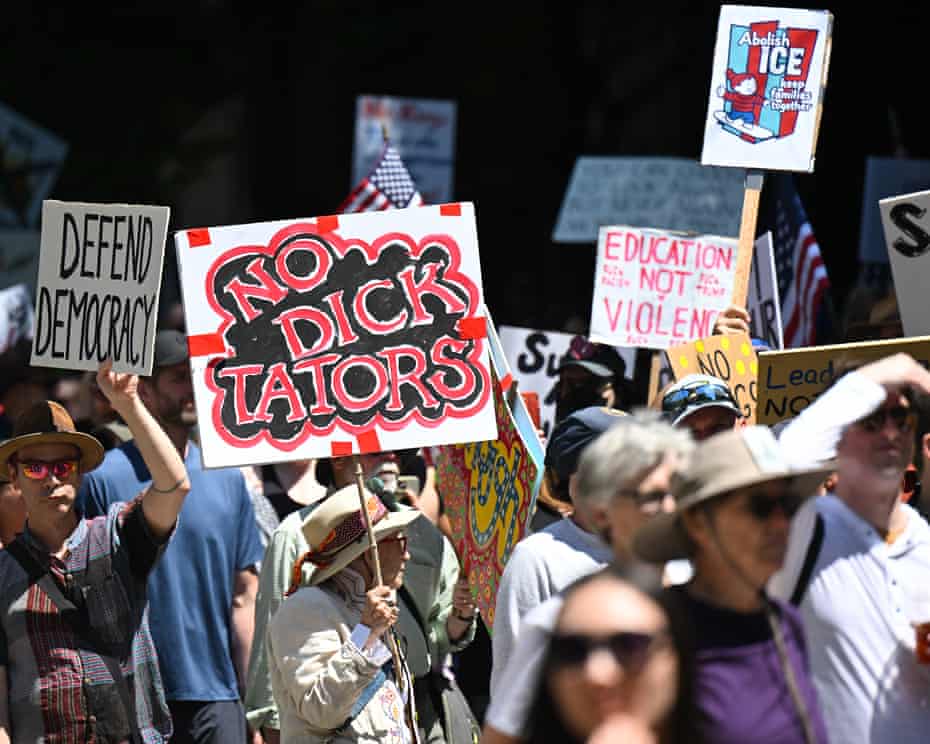As tanks rumbled through the streets of Washington on Saturday in a show of military might, millions of Americans across all 50 states staged mass demonstrations against what organisers described as the authoritarian excesses of Donald Trump’s administration.
The nationwide protests, branded “No Kings”, took place at around 2,100 locations, from major cities to rural communities. The demonstrations were spearheaded by a coalition of more than 100 groups committed to nonviolent resistance, in stark contrast to the heavily militarised response seen in several Republican-led states.
Interest in the protest surged following Trump’s deployment of US Marines and National Guard troops to Los Angeles earlier in the week. The controversial move, made without state authorisation, was aimed at suppressing ongoing protests against the administration’s aggressive immigration policies, prompting widespread criticism and drawing comparisons to military crackdowns of the civil rights era.
Organisers reported a record turnout, estimating that millions took part nationwide. Over 200,000 marched in New York, and more than 100,000 filled the streets of Philadelphia. Even small towns like Pentwater, Michigan, which has a population of just 800, saw impressive numbers, with 400 residents joining the demonstrations.
Protests largely peaceful
The protests were largely peaceful, though several turned volatile by evening. In Los Angeles and Portland, police declared unlawful assemblies and deployed tear gas and rubber bullets to disperse crowds.
The day’s events were also marred by political violence. In Minnesota, two Democratic lawmakers were shot early in the morning, one fatally, along with her husband, in what officials are calling a politically motivated attack. Despite state warnings urging people to avoid public gatherings, thousands rallied at Minnesota’s state capitol, refusing to be intimidated.
One demonstrator, Perry McGowan, carried a sign bearing the names of the slain lawmakers, Melissa Hortman and John Hoffman. “There’s way too much gun violence, way too much inhumanity,” he said. “We need to push back and restore civility.”
In Texas, officials confirmed they had received credible threats against state lawmakers planning to attend a No Kings protest. The state’s Republican governor, Greg Abbott, had already mobilised the National Guard in anticipation of unrest.
Florida’s Governor Ron DeSantis stirred further controversy, saying drivers could legally run over protesters if surrounded by crowds. “You don’t have to sit there and let the mob drag you out of your car,” he said.
In San Francisco and Virginia, vehicles ploughed into crowds, leaving several injured. Though most injuries were not life-threatening, the incidents underscored the day’s tense atmosphere.
In Los Angeles, where demonstrations outside City Hall began with peaceful vigils and a sea of American flags, tensions flared later at a federal building. Protesters chanted “Leave LA!” at National Guard personnel and reportedly threw objects at the facility. Police declared an unlawful assembly by late afternoon and used tear gas to disperse protesters.
In Portland, federal agents responded similarly outside an Immigration and Customs Enforcement (ICE) facility after protesters allegedly attempted to breach the entrance.
Organisers of No Kings intentionally avoided holding a protest in Washington DC, choosing instead to create distance from Trump’s military parade and avoid possible escalation. Instead, DC locals participated in a “DC Joy Day” celebrating community, culture and resistance through unity.
Still, a smaller protest of about 300 people, organised by the group Refuse Fascism, marched to the White House. Among them was Army veteran Chris Yeazel, who criticised Trump’s recent partisan speech to troops at Fort Bragg. “This is the nation’s capital,” Yeazel said. “This is exactly where we need to protest.”
Trump had earlier warned that protesters would be met with a “very big force”, although the White House later attempted to soften the rhetoric, insisting the president supported peaceful demonstrations.
Asked about the No Kings protests during a White House event on Thursday, Trump said, “I don’t feel like a king. I have to go through hell to get things approved.”



